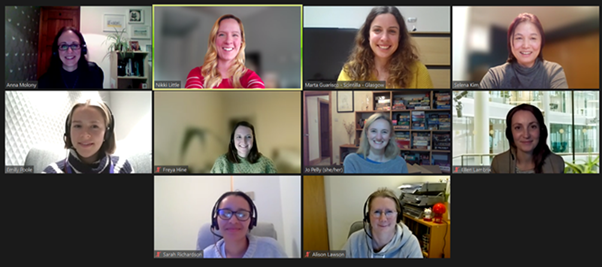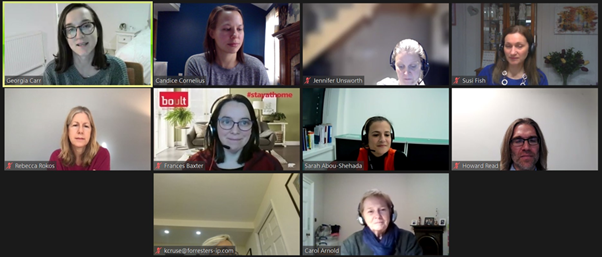This blog post from Emily Teesdale of Airbus – co-coordinator of the Women in IP coffee dates – sets out the key insights and discussion points from the event.
This was another great coffee event with lively discussions and learning about other people’s views. It was especially great to get some US perspectives. We looked at the topic by considering three questions:
- Someone assuming that a person with a Scottish accent would be grateful during the referendum to have Scotland breaking apart from England. Similar examples with respect to Brexit.
- “Come to this pitch; the client is also female.”
- In recruiting, feedback being given that someone speaks English very well.
- Being asked “where are you really from?” Or “where are your family from?” [asked to minorities and people of colour].
- In the US, especially during civil unrest especially last year, a lot of comments like “Some of my best friends are Black.”
- Referring to groups as “you guys” when it’s not all men.
- Upon returning from maternity leave, being told that it’s so great that she decided to do so and that she’s able to and how hard it must be, can’t imagine. (Would a man returning from paternity leave ever be told this?)
- An Asian woman being told she must not be the one arguing because Asian women are meek.
- Assumption that all minority groups have the same issues.
- Pushing men to take paternity leave.
- “Women are used to getting things done and are motherly.”
- One group noted that cultural differences might lead to some examples.
- Misunderstandings can occur between men and women, particularly when drinking at conferences. What was understood to be a “business” dinner by a woman ended up being framed as a date by the man who had proffered the invitation. In these circumstances even though the woman did nothing wrong, they worry whether they were sending the wrong signals, or should have done something differently.
- A situation where in a meeting with a client, the client made a very inappropriate joke, making the person feel quite uncomfortable.
- “Isn’t it a shame you can’t stay home with your kids?”
- Assumptions around individuals needing certain accommodations based on their name, nationality, etc.
- One example of a company encouraging employees to submit a profile of themselves for others to get to know them. But, all the profiles submitted were rather homogeneous. Would have been better for some of those people to wait before submitting their profile to allow more “diverse” profiles to be submitted without “sticking out” from the others too much.

Another of the breakouts
2. Do you think this is magnified in any particular setting within IP?
Many groups did not think it was particularly magnified within IP. For example, one group noted that one advantage of being an IP professional is the ability to work internationally with diverse colleagues. But one group did note that many in the profession are middle-aged white men and so perhaps more “thoughtless” comments might happen within IP because of that. One group noted the need to encourage recruitment of more diverse candidates.

Plenty to smile about…
3. What could we do in such a situation where a friend, family member or colleague’s well-intentioned statement has a negative impact on the recipient? All suggestions welcome. (The suggestions below also give advice for ourselves, too…)
- Focus on what was said, not on who they are – so as to not alienate the person, while making sure they understand the impact of their words.
- Get more comfortable pointing out examples so people can learn.
- Education and focus on inclusion in the workplace.
- Communication is important; one should be sensitive (not silent) about these topics.
- Be kind to self/others.
- Those in leadership positions may have to be more proactive in these situations to explain to the speaker their unintended but negative impact on the recipient.
- One group raised the question of whether you engage directly with the offending speaker, or indirectly. They thought this may depend upon the relationship with the speaker or the hierarchy of the organisation/firm.
- One group had an example of an opposing counsel sending an email requesting an apology for mis-addressing an associate and secretary.
- Employers should have a policy in place allowing people to come forward where they have issues and which sets clear boundaries and guidelines for appropriate behaviour.
- For men – consider “if I asked this of another man, would it be odd?”
- For people generally – “would I say this in front of friends and family?”
- If it’s weird, don’t say it! Think before speaking.
- Use common sense to judge a scenario.
- If you don’t know how to address somebody, ask them; it’s OK to ask!
- Avoid making assumptions about people based on their background, sex, ethnicity, area of expertise (not all physicists are men!).
- When you find yourself in a situation where something is said that upsets somebody, be an ally and call out the behaviour right away. This is often more helpful than to follow up afterwards.
- Follow-up afterwards is better than nothing though and one person explained that it is often difficult to speak up at the time (“If it’s a train wreck, I don’t want to get hit!”).
- Even just showing the recipient that you noticed might help them feel “seen”. You could simply say to them “well that was awkward!” It was also noted that if they do not want to talk about the incident, or do not want you to do anything about it, you should respect that.
- To the person who made the comment, you could say: “How do you think that landed?”
- Some noted that as an ally, you have to “pick your battles” to a certain extent. Often, there is no point discussing certain topics with, for example, an elderly relative, but there is much more point with a work colleague.
- One example was of a person giving advice that did so in a way that felt angry and aggressive to the recipient. When the recipient followed up on it, it hadn’t been intended that way, and the person who gave the advice was very sorry and completely surprised that it had been received that way. Take-home message here was that you should let somebody know in this situation so they can give advice differently in the future.
- One participant gave the great advice to ask them to explain the joke they were making and keep asking “why is that?” to get them to see it was inappropriate.
- Another approach could be to get the person saying the comment to see the “human side” – ie try and get them to see it from the recipient’s point of view.
Thank you to everyone for your open and honest discussions and your suggestions. The prize for the best idea though has to go to whoever suggested saying: “Would you say that to the Rock?”

Thoughtful faces in another breakout room
Our next coffee date will be on Tuesday 15 February 2022 at 8.30 am on the theme of “Invisible Labour”. Find out more, and register to attend, via this link.
Page published on 18th January 2022
Page last modified on 20th January 2023



